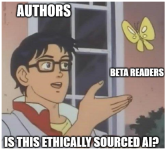PennyThompson
"Oddly Sweet"
- Joined
- Nov 17, 2024
- Posts
- 1,817
I don't think I totally understand this? It would be like if you were driving in your car and stopped at a stop light and someone pulled up next to you and told you your gas cap was open. Do you just keep driving around with the gas cap open, angry at yourself for not noticing but unwilling to pull over and close the lid?from that point on, I see two choices, and both would bother me a lot. The first is to reject your idea and keep everything as it is, and let the story be worse for it.
The second is to embrace your idea and rewrite the character and make the story better... but not fully mine anymore. I didn't come up with that, and the "coming up" part of writing is very important to me.
It's basically no different than asking AI to come up with an idea for you, except from an ethical standpoint.
